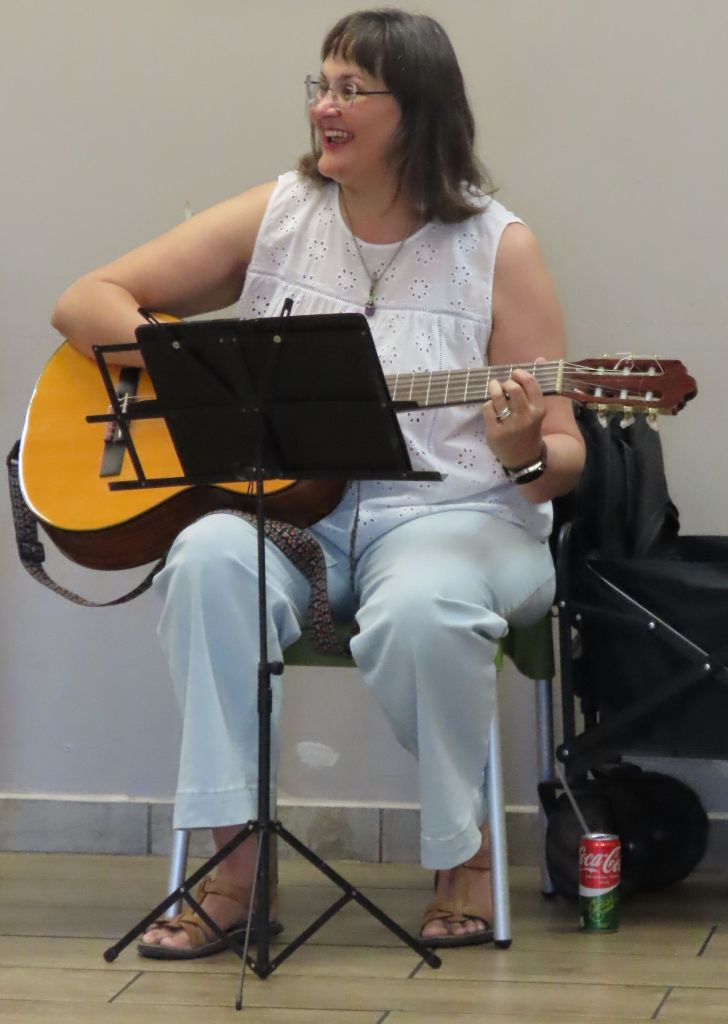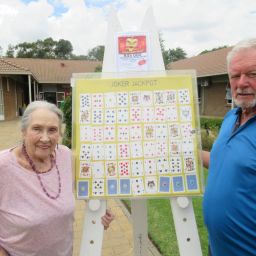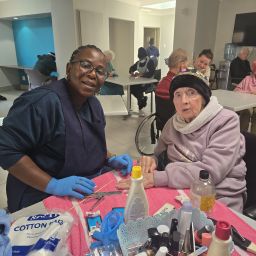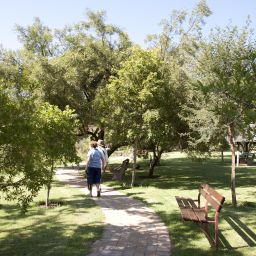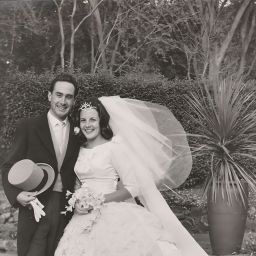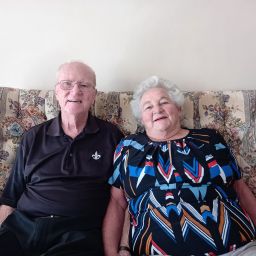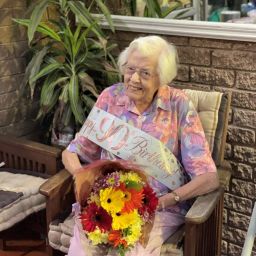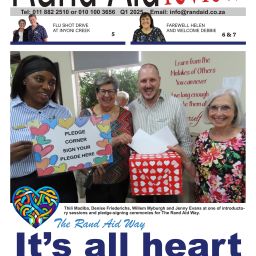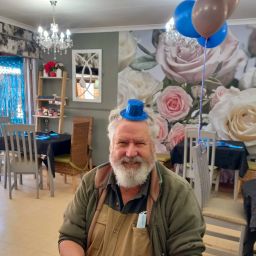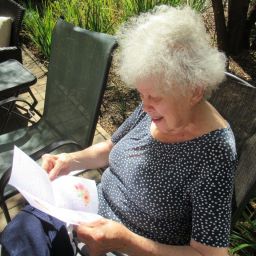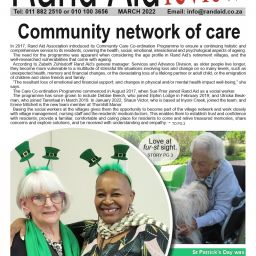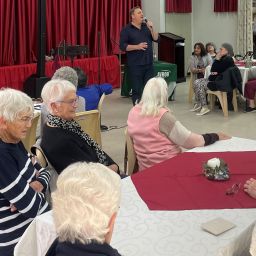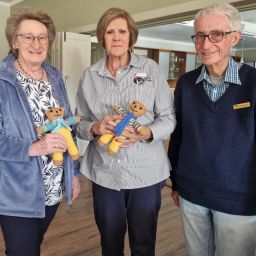Annelet Prinsloo, a qualified music therapist with a master’s degree who facilitates group sessions at Ron Smith Care Centre, writes about the powerful impact of music on people living with dementia:
In the journey of dementia care, the arts – especially music – offer a profound way to reconnect, comfort and restore dignity. When words fade and memories falter, creativity becomes the language through which individuals continue to express their humanity.
Seeing the person, not the disease
Tom Kitwood’s philosophy of person-centred care reminds us that every person living with dementia remains a unique individual with a rich inner world. The arts are a vital way of giving expression to thoughts and ideas, asserting individuality and maintaining a sense of identity.
As John Killick and Kate Allan write in Celebrating the Arts in Dementia Care: Tapping a Rich Resource (2003), engaging in creative activity, whether through painting, movement, poetry or song, is not just enjoyable, it is deeply therapeutic. These activities can enhance self-esteem, stimulate joy, and provide meaningful connections.
Therapists aim to create an environment where the creative process can flourish, allowing people to express emotions and experiences that may no longer find form in words.
Music: A pathway to connection and healing
Music is often described as a ‘creative container for valuable communication and sharing’. In dementia care, it becomes much more – it is a bridge between past and present, self and others.
Music therapydraws on old, well-established emotional memories, enhancing both mood and physical well-being. It can:
- Increase self-esteem by enabling achievements beyond one’s perceived limitations;
- Foster communication and relationships, both verbal and non-verbal;
- Reduce agitation, wandering, and distress;
- Stimulate reminiscence and relational bonding through familiar songs.
Rachael Darnley-Smith, in Music Therapy with Elderly Adults (2002), describes music as an invitation for clients ‘to present themselves as human beings through the medium of sound’. By encouraging individuals to create any sound they wish, therapists nurture freedom, spontaneity, and self-expression, whether through improvisation, song or simply the rhythm of breath.
A framework for being together
In A Comprehensive Guide to Music Therapy (Wigram, Nygaard & Bonde, 2002), music is shown to help people ‘feel understood’ and reconnect with a sense of self. Recognising a familiar song amid confusion can reawaken memory and identity – linking the present moment with the continuity of a life lived.
For one woman with dementia, recognising a song brought calm and connection: “It was like recognising a bit of herself,” the authors noted. “Music gave her a frame where she could handle being together with other people.”
Music therapy sessions, whether group or individual, often focus on:
- Relaxation and stress reduction
- Physical and social stimulation
- Cognitive activation
- Communication and behavioural support
Techniques include improvisation, familiar songs, movement, folk dancing, songwriting, reminiscence and music listening – all tailored to the individual.
When words fail, music speaks
Research by Ridder, Wigram and Ottesen (2009) highlights the unique role of music for individuals with frontotemporal dementia, a condition often accompanied by behavioural and psychological symptoms. For many in the later stages of dementia who have lost verbal communication, music becomes a vital channel for self-expression and identity.
Even when memories fade, musical sensibility and rhythm often remain intact. Recognising a melody can unlock emotions – happiness, longing or peace – when other forms of recognition have disappeared.
Neurologist Oliver Sacks (2007) described this beautifully: “Musical perception, musical sensibility, musical emotion, and musical memory can survive long after other forms of memory have disappeared.”
Music therapy allows for this survival of the self through sound, creating moments of recognition, belonging, and coherence.
Measuring the Impact: MiDAS
The Music in Dementia Assessment Scales (MiDAS), developed by McDermott, Orrell and Ridder (2014, 2015), provide a framework for evaluating subtle yet powerful responses to music. Even small signs – like longer eye contact, a smile or a turn of the head – signal awareness and engagement.
Through music, people often take initiative: Requesting favourite songs, exploring new instruments and reminiscing about life stories. Staff frequently report calmer moods, less agitation and an overall sense of happiness among participants.
As one participant expressed simply: “Music makes me happy.”
Beyond symptom reduction: Focusing on life
Music therapy aligns with a salutogenic philosophy – focusing on health, strength and well-being rather than disease. It values the person’s individuality and capacity for joy, meaning and connection.
Every musical encounter is a reminder that the person behind the diagnosis still exists fully in the ‘here and now’.
Music therapy in palliative care
At the end of life, music therapy offers comfort, dignity and emotional expression when words are no longer enough. It addresses physical, emotional, social, cognitive and spiritual needs – helping ease pain, anxiety, loneliness and fear.
Techniques include:
- Songwriting, to express love, gratitude, or unresolved feelings;
- Improvisation, to release and process deep emotions;
- Singing, to foster belonging and emotional release;
- Guided imagery and music, to access the unconscious and bring peace;
- Musical life review, to reflect on and celebrate life’s journey.
These approaches can help clients reconnect with their identity, re-author life narratives and find acceptance. Music also comforts loved ones, offering moments of shared peace and helping sustain caregivers through bereavement.
Music therapy services
Annelet offers both group and individual music therapy sessions. If you would like to learn more about music therapy, or if you or a loved one could benefit from sessions – particularly in end-of-life or dementia care – contact her at annelet@annimotion.co.za. You can also reach her through Ron Smith Care Centre’s Simonè Botha at sbotha@randaid.co.za
